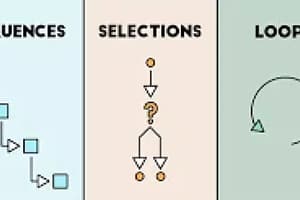Podcast
Questions and Answers
What is looping?
What is looping?
refers to the repeated execution of a statement.
What is a While Loop?
What is a While Loop?
a structure that allows actions to be repeated while a condition is true.
What is a DoWhile Loop?
What is a DoWhile Loop?
a structure that tests the condition at the end of the body of the loop.
What is a For Loop?
What is a For Loop?
What does the Math Class do?
What does the Math Class do?
How are Math Methods called?
How are Math Methods called?
What is the syntax of a Math Method?
What is the syntax of a Math Method?
All math methods return data type double.
All math methods return data type double.
The Math class must be invoked using Math and the dot operator.
The Math class must be invoked using Math and the dot operator.
What does E() return?
What does E() return?
What does PI() return?
What does PI() return?
What does Abs() return?
What does Abs() return?
What does Ceiling(double) return?
What does Ceiling(double) return?
What does Cos(double) return?
What does Cos(double) return?
What does Exp(double) return?
What does Exp(double) return?
What does Floor(double) return?
What does Floor(double) return?
What does Log(double) return?
What does Log(double) return?
What does Max(int,int) return?
What does Max(int,int) return?
What does Min(int,int) return?
What does Min(int,int) return?
What does Pow(int) return?
What does Pow(int) return?
What does Round(double) return?
What does Round(double) return?
What does Sign(int) return?
What does Sign(int) return?
What does Sin(double) return?
What does Sin(double) return?
What does Sqrt(double) return?
What does Sqrt(double) return?
What does Tan(double) return?
What does Tan(double) return?
What does Truncate(double) return?
What does Truncate(double) return?
What does Acos() return?
What does Acos() return?
What does Asin() return?
What does Asin() return?
What does Atan() return?
What does Atan() return?
What does DivRem() do?
What does DivRem() do?
What is an Array used for?
What is an Array used for?
What does an Array store?
What does an Array store?
A specific element in an array is easily accessed by ____.
A specific element in an array is easily accessed by ____.
What is a One Dimensional Array?
What is a One Dimensional Array?
What does the length/size of an Array represent?
What does the length/size of an Array represent?
What are the two steps to create an Array?
What are the two steps to create an Array?
To declare an Array, what must you specify?
To declare an Array, what must you specify?
What is the declaring syntax for an Array?
What is the declaring syntax for an Array?
What does [] specify in an Array?
What does [] specify in an Array?
What is the initializing syntax for an Array?
What is the initializing syntax for an Array?
What does the keyword 'new' do in Array handling?
What does the keyword 'new' do in Array handling?
What are the two steps to use an Array?
What are the two steps to use an Array?
How is an Element accessed in an Array?
How is an Element accessed in an Array?
What is a Selection Structure?
What is a Selection Structure?
What can a Boolean data type hold?
What can a Boolean data type hold?
What are Relational Operators intended for?
What are Relational Operators intended for?
What are Logical Operators used for?
What are Logical Operators used for?
What is an IF selection structure?
What is an IF selection structure?
What is an IF/ELSE selection structure?
What is an IF/ELSE selection structure?
What is IF/ELSE IF/ELSE known for?
What is IF/ELSE IF/ELSE known for?
What are Curly Braces {} used for?
What are Curly Braces {} used for?
What are Code Blocks used for in C#?
What are Code Blocks used for in C#?
Study Notes
Looping Concepts
- Looping executes a sequence of statements repeatedly.
- While Loop continues execution as long as a specified condition remains true.
- DoWhile Loop resembles a While Loop but checks its condition after the loop body executions.
- For Loop performs a series of statements repeatedly, managing the loop variable within a compact structure.
Math Class Overview
- Contains various methods for performing mathematical calculations efficiently.
- Methods are accessed using "Math" followed by a dot and the method name (e.g., Math.MethodName(arguments)).
- All Math methods return a data type of double, ensuring precise mathematical results.
Key Math Methods
- E() returns the base of natural logarithms as a double.
- PI() provides the value of π (pi) as a double.
- Abs() calculates the absolute value of a number.
- Ceiling(double) identifies the smallest integer greater than the specified value.
- Cos(double) computes the cosine of an angle in radians.
- Exp(double) evaluates e raised to a specified power.
- Floor(double) finds the largest integer less than the specified value.
- Log(double) gives the natural logarithm of the specified value.
- Max(int, int) returns the higher of two given values.
- Min(int, int) returns the lower of two specified values.
- Pow(int, int) computes a number raised to a specified power.
- Round(double) rounds a number to the nearest integer.
- Sign(int) returns the sign of a given value.
- Sin(double) finds the sine of an angle in radians.
- Sqrt(double) returns the square root of a value.
- Tan(double) determines the tangent of an angle in radians.
- Truncate(double) discards fractional digits and returns the integer portion.
- Acos() calculates the angle whose cosine equals a specified value.
- Asin() computes the angle corresponding to a specified sine value.
- Atan() provides the angle corresponding to a specified tangent value.
- DivRem() calculates both the quotient and the remainder of two numbers.
Arrays in C#
- Arrays store collections of data with a fixed size, requiring elements to be of the same data type.
- Elements are accessed through specific indices in the array.
- One Dimensional Arrays provide the simplest storage format, listing elements in order.
- Array length indicates how many values can be stored.
Array Declaration and Initialization
- To declare an array, specify the data type and the name.
- Declaring syntax is structured as:
datatype[] arrayName;. - The indication or rank of an array is represented using square brackets [].
- Initialization syntax for arrays follows:
datatype[] arrayName = new datatype[size];, where "new" is the keyword to instantiate the array.
Array Usage
- Accessing array elements involves indexing the array name.
- Two primary steps for using an array are declaration/initialization and assigning/accessing values.
Selection Structures
- Involves Boolean data types, relational operators for comparisons, and logical operators for forming complex conditions.
- Boolean data types can only hold true or false values.
- Relational operators compare operands, yielding boolean results based on conditions.
- Logical operators create complex expressions involving multiple conditions.
Types of IF Structures
- IF structure is a single-branch choice mechanism that executes a block of code if a condition is true.
- IF/ELSE structure provides a two-branch option for executing one block of code if a condition is true, or another if false.
- IF/ELSE IF/ELSE provides multiple branching options, allowing for complex decision-making.
Code Blocks and Grouping
- Curly braces {} are used to group multiple statements in a code block.
- Code blocks organize functionalities such as methods or classes, clarifying related code functionalities in C#.
Studying That Suits You
Use AI to generate personalized quizzes and flashcards to suit your learning preferences.
Description
Explore the fundamentals of looping structures in C#. This quiz covers key concepts such as 'While Loop', 'DoWhile Loop', and 'For Loop'. Test your knowledge and deepen your understanding of these essential programming concepts.




